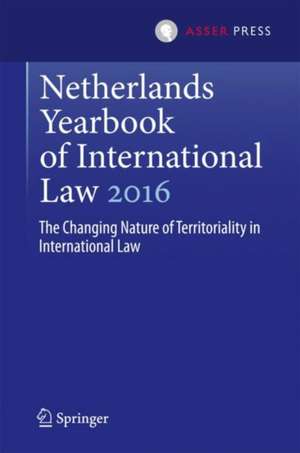Netherlands Yearbook of International Law 2016: The Changing Nature of Territoriality in International Law: Netherlands Yearbook of International Law, cartea 47
Editat de Martin Kuijer, Wouter Werneren Limba Engleză Hardback – 22 dec 2017
The Netherlands Yearbook of International Law was first published in 1970. It offers a forum for the publication of scholarly articles of a conceptual nature in a varying thematic area of public international law.
Din seria Netherlands Yearbook of International Law
- 18%
 Preț: 1231.64 lei
Preț: 1231.64 lei - 27%
 Preț: 1449.70 lei
Preț: 1449.70 lei - 27%
 Preț: 1357.63 lei
Preț: 1357.63 lei - 27%
 Preț: 2165.55 lei
Preț: 2165.55 lei - 15%
 Preț: 654.30 lei
Preț: 654.30 lei - 20%
 Preț: 584.18 lei
Preț: 584.18 lei - 15%
 Preț: 650.69 lei
Preț: 650.69 lei - 15%
 Preț: 663.27 lei
Preț: 663.27 lei - 18%
 Preț: 971.49 lei
Preț: 971.49 lei - 15%
 Preț: 664.11 lei
Preț: 664.11 lei - 15%
 Preț: 661.84 lei
Preț: 661.84 lei - 15%
 Preț: 664.61 lei
Preț: 664.61 lei - 15%
 Preț: 658.70 lei
Preț: 658.70 lei - 15%
 Preț: 651.02 lei
Preț: 651.02 lei - 15%
 Preț: 653.14 lei
Preț: 653.14 lei - 20%
 Preț: 557.75 lei
Preț: 557.75 lei - 15%
 Preț: 644.95 lei
Preț: 644.95 lei - 15%
 Preț: 644.30 lei
Preț: 644.30 lei - 15%
 Preț: 653.14 lei
Preț: 653.14 lei - 18%
 Preț: 959.82 lei
Preț: 959.82 lei - 15%
 Preț: 641.53 lei
Preț: 641.53 lei - 18%
 Preț: 895.76 lei
Preț: 895.76 lei - 18%
 Preț: 952.26 lei
Preț: 952.26 lei - 18%
 Preț: 953.65 lei
Preț: 953.65 lei
Preț: 1229.91 lei
Preț vechi: 1499.88 lei
-18% Nou
Puncte Express: 1845
Preț estimativ în valută:
235.34€ • 245.71$ • 194.78£
235.34€ • 245.71$ • 194.78£
Carte tipărită la comandă
Livrare economică 04-18 aprilie
Preluare comenzi: 021 569.72.76
Specificații
ISBN-13: 9789462652064
ISBN-10: 9462652066
Pagini: 450
Ilustrații: XV, 424 p.
Dimensiuni: 155 x 235 mm
Greutate: 0.79 kg
Ediția:1st ed. 2017
Editura: T.M.C. Asser Press
Colecția T.M.C. Asser Press
Seria Netherlands Yearbook of International Law
Locul publicării:The Hague, Germany
ISBN-10: 9462652066
Pagini: 450
Ilustrații: XV, 424 p.
Dimensiuni: 155 x 235 mm
Greutate: 0.79 kg
Ediția:1st ed. 2017
Editura: T.M.C. Asser Press
Colecția T.M.C. Asser Press
Seria Netherlands Yearbook of International Law
Locul publicării:The Hague, Germany
Cuprins
The Changing Nature of Territoriality in International Law.- The Paradoxical Place of Territory in International Law.- A State Without Territory – Science Fiction or Reality?.- Territory in The Law of Jurisdiction: Imagining Alternatives.- Cartographies of the Present: ‘Contingent Sovereignty’ and Territorial Integrity.- Data Territories: Changing Architectures of Association in International Law.- ‘Spoofed Presence Does Not Suffice’: On Territoriality in the Tallinn Manual.- Cybercrime, Evidence and Territoriality: Issues and Options.- Reconfiguring Territoriality in International Economic Law.- Extraterritorial Obligations and the Obligation to Protect.- Citizenship at Home and Across Borders .- Territoriality and Asylum Law: The Use of Territorial Jurisdiction to Circumvent Legal Obligations and Human Rights Law Responses.- Schrödinger’s Cake? Territorial Truths for Post-Brexit Britain.- Dutch Practice in International Law.- The Dutch Contribution to the Armed Coalition against ISIS.- The Dutch Referendum on the EU-Ukraine Association Agreement: Legal Implications and Solutions.- The Netherlands: A Tax Haven?.- Recent Developments Regarding the Direct and Indirect Application of Treaties by Dutch Courts: Fresh Approaches to Self-Executing, Non-Self-Executing and Non-Binding International Law.- Table of Cases.- Index.
Textul de pe ultima copertă
International law holds a paradoxical position with territory. Most rules of international law are traditionally based on the notion of State territory, and territoriality still significantly shapes our contemporary legal system. At the same time, new developments have challenged territory as the main organising principle in international relations. Three trends in particular have affected the role of territoriality in international law: the move towards functional regimes, the rise of cosmopolitan projects claiming to transgress state boundaries, and the development of technologies resulting in the need to address intangible, non-territorial, phenomena. Yet, notwithstanding some profound changes, it remains impossible to think of international law without a territorial locus. If international law is undergoing changes, this implies a reconfiguration of territory, but not a move beyond it.
The Netherlands Yearbook of International Law was first published in 1970. It offers a forum for the publication of scholarly articles of a conceptual nature in a varying thematic area of public international law.
The Netherlands Yearbook of International Law was first published in 1970. It offers a forum for the publication of scholarly articles of a conceptual nature in a varying thematic area of public international law.
Caracteristici
Unique in-depth analysis of different aspects of the evolving relationship between territory and international law Discusses how the development of technologies resulting in intangible phenomena affects our understanding of territory Discusses the notion of territoriality within specific sub-fields of international law (e.g., international economic law, human rights law, refugee law, law of international military operations) Includes contributions analyzing Dutch practice in international law and geared towards an international (non-Dutch speaking) audience
